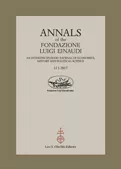The paper investigates the movement of reduction and involution of happiness that started in the Age of Enlightenment and continues today: from the emergence of the idea of happiness to the reduction to its economic definition (GDP per capita), then from the criticism of wealth indicators to the rediscovery of the goal of buen vivir, of “frugal affluence”, of joyful sobriety, in the context of “prosperity without growth”.



